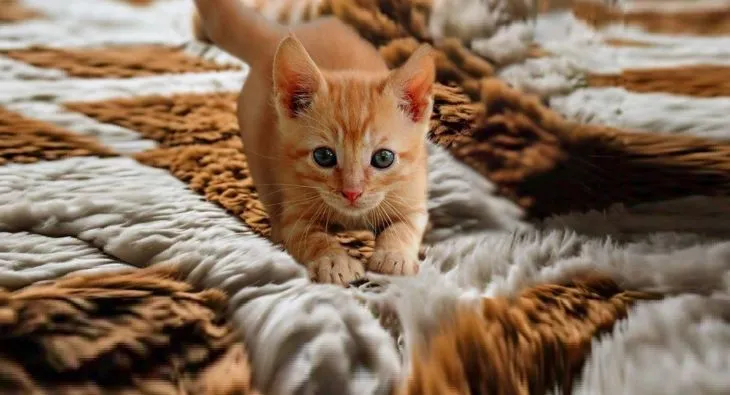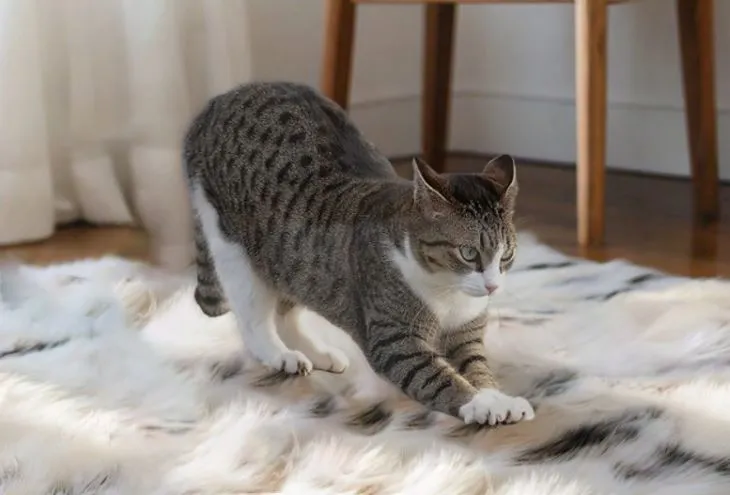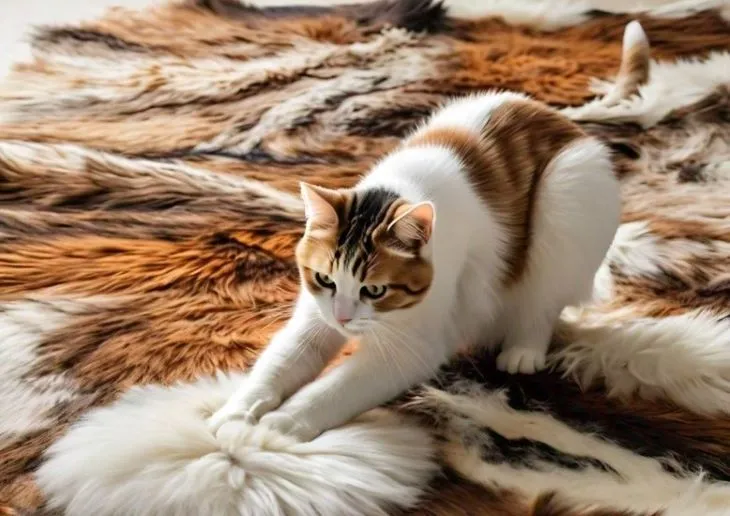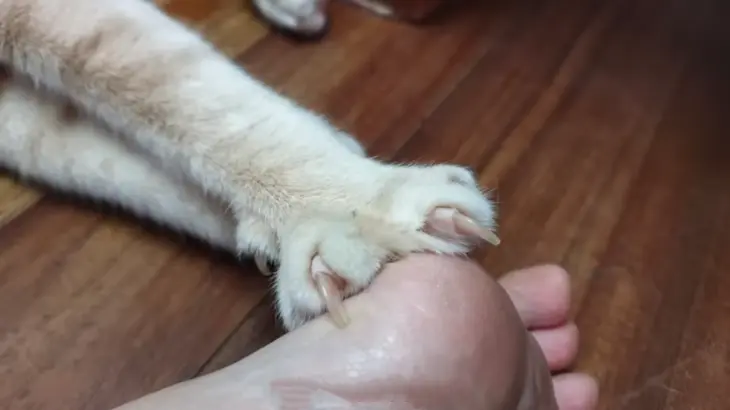Why Do Cats Knead? Reasons & Meaning Behind This Behavior
Cats Knead because of an instinctive behavioral kittenhood habit or sometimes they do it to demonstrate their love and trust for you.
By: Elizabeth Rikas

The information in this article is intended to educate cat parents and is not a substitute for veterinary guidance. In case of any concerns about your cat’s health, please talk with your veterinarian.
What Is Cat Kneading?
Every cat parent has likely seen their feline friend kneading—an adorable behavior where cats rhythmically press their paws into something soft, like your lap or a cozy blanket. Often accompanied by purring, this act resembles a baker kneading dough, which is why it’s sometimes called “making biscuits.”
Why Do Cats Knead Their Paws?
Kneading is a natural and endearing trait that reveals a lot about your cat’s instincts and feelings. But why do cats engage in this peculiar behavior? The reasons vary; it could be a comforting habit from kittenhood, a way to create a cozy resting spot, or even a sign of affection and trust.
Interested Read: Do Cats Get Jealous?

Instinctual Behavior
This adorable habit originates in kittenhood. When nursing, kittens knead their mother’s belly to stimulate milk flow.
Feline behavior experts believe that cats carry this instinct into adulthood. Although there’s no milk involved anymore, the action likely brings back the comforting and secure feelings they experienced as kittens.
Creating A Cozy Spot
Imagine your cat as a tiny lion in the house. Just like lions pat down tall grasses before taking a nap on them, your cat might soften a blanket by kneading it.
Stretching And Exercise
Sleeping is what most cats are good at. After napping for so long, some cats may choose to massage their paws up and down as if stretching sore muscles in order to get blood flowing freely in their veins.
Showing Affection
This is perhaps the sweetest reason of all. When your cat kneads on you, it’s a sign of deep trust and affection, showing they feel safe and cherished in your presence. It’s like receiving a warm hug from your feline friend, a gesture that not only brings them comfort but also lets you know just how much they love and rely on you.
Should You Be Concerned About A Cat Kneading?
If you’ve ever wondered whether your cat’s kneading behavior is something to worry about, you’re not alone. While it’s generally a harmless and natural act, there are a few instances where this adorable habit might need closer attention. Let’s explore when you should be concerned and how to address any potential issues.
Excessive Kneading Or Obsession
If your cat’s kneading has become excessive or obsessive, it could be a sign of underlying anxiety or stress. Cats that knead excessively may damage furniture or even hurt themselves in the process. It’s important to investigate the root cause of this behavior to address any uneasiness your cat may be experiencing. Identifying and resolving the stressors can help your cat feel more at ease and reduce compulsive kneading.
Associated With Other Signs Of Stress
When your cat’s kneading is accompanied by other behaviors like excessive meowing, aggression, appetite changes, and urinating outside the litter box, then this indicates there are bigger health issues around them or their environment.
How To Stop A Cat From Kneading?
You might not be successful in stopping a cat from kneading but there are some positive ways to handle this habit of your feline friend.

Redirection
In case your cat’s kneading on your lap becomes so intense, gently lift him and place him in a nearby “kneading zone” you have designated. It could be an ultra-soft plush blanket laid on the couch next to you. You might even like to sprinkle some catnip onto it to make it smell more attractive.
Avoid Punishment
Cats do not comprehend punishment as well as people do. In fact, scolding, shouting, or squirting water at your cat would only instill fear and confusion in her/him. More anxiety could occur from this and even worsen kneading behavior for that matter besides damaging the owner-cat relationship.
Trimming Nails
If indeed, what bothers you most is the sharpness of your cat’s claws, then concentrate on having them trimmed regularly. This will greatly reduce any discomfort you may experience during their kneading sessions. You can trim your cat’s nails yourself or take them to a groomer or vet.
Help! My Cat Kneading Is Hurting Me
While this kneading behavior is a sign of affection, those sharp claws can be tough to handle. There are gentle ways to manage this habit without discouraging your cat’s natural instincts. Here’s how you can protect yourself while still allowing your cat to express its love:

Thick Blanket Barrier
It is one of the simplest solutions when your cat is around to place a thick fluff on your lap. It cushions their claws from touching your skin and making you comfortable.
“Ouch!” And Remove
When your cat digs in, say “ouch” clearly and firmly to let her know that she is hurting you. Calmly get out of there or pick up your cat gently and put her next to you. This lets them know that if they knead too hard, their favorite lap will vanish into thin air.
Positive Training
This one takes a bit more time and patience but it works wonders. Rewarding your cat with treats or praise when it sits peacefully without kneading is another option. This will encourage good behavior as well as help them relate being calm to something pleasant.
How To Address Problem Kneading In Cats (Do’s & Don’ts)
Do’s
- Take your cat to the vet to establish whether or not he has health issues.
- In order to cure boredom or stress, let your cat play and exercise more.
- Ensure that you have some secure areas where you can take your cat.
Don’ts
- If a cat kneads, it should be punished.
- Disregard signals of illness.
- Make them communicate when they don’t want.
Frequently Asked Questions
Conclusion
The exact reasons for the kneading behavior are not entirely clear, however, kneading is mostly a harmless action in cats. Kneading is written in their instincts when they are young and nursing milk from their mothers. It could also be connected with feelings of safety and relaxation. Anyhow, if kneading becomes too much or obsessive or if accompanied by anxiety signs, it’s important to consult your vet so that any hidden medical problems or worries can be ruled out.
